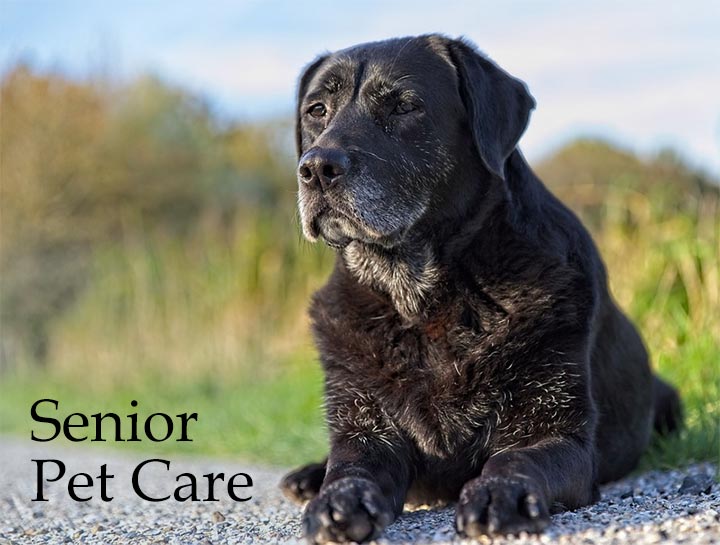Senior Pet Care

Did you know that dogs and cats are considered to be seniors at the age of 7? In human years, a dog would be considered 44-56 years old and a cat would be considered 54 years old. Larger breeds can become a senior at an even younger age of just 5 years old! As our grey-muzzled pets change with age, their healthcare should also change. These changes include nutrition, exercise, medications/supplements, laboratory testing, and more frequent vet visits. By maintaining and helping your senior pet with their health needs, they can have a longer, happier life.
As a senior pet gets older, many people don’t think about their different nutritional needs. Their bodies require different ingredients as their metabolism changes. In general, both dogs and cats need a diet with lower calories, lower fat levels, adequate protein, and a higher quantity of fiber. Senior pets don’t move around and exercise as often as they did when they were younger which can cause obesity. Because of this, senior pets should be fed a smaller quantity of their diet. Most importantly, aging can cause senior pets to be affected by a variety of diseases that slow down their organ functions. Having a diet specific for your pet can help them with many difficulties they face as they age.
As pets age, they have a higher tendency to gain weight. Obesity is the most common nutritional disease in dogs and cats. Obesity causes much more problems than just becoming overweight. It can cause a higher risk of arthritis, heart disease, and diabetes. It can also cause a greater risk with surgery and anesthesia. Overall, obesity shortens a pet’s life. A veterinarian-recommended diet and exercise are great ways to help your pet lose weight and stay in shape. Taking your dog for walks and playing with your cat with a laser are great ways to keep your senior pets active.
Medications and supplements may become needed for senior pets. Diseases such as heart disease, kidney/urinary tract disease, liver disease, joint/bone disease (arthritis), diabetes, and cancer can occur. Vitamin and mineral deficiencies can also occur. As their bodies age, they cannot produce and keep up with the correct amounts that their body requires to stay healthy. It is important to make sure they are getting the correct levels that they need to keep them healthy for their older lifestyle. Talking to your veterinarian about medications and supplements for your pet can help prevent these diseases.
Just like humans get lab work during their annual exam, veterinarians like to collect samples to look at the overall organ function in senior pets. These tests are recommended for senior pets more often than other ages of pets because of diseases that tend to occur during this life stage. A CBC (complete blood count) blood test can check for anemia, infection, inflammation, and the ability for the blood to clot properly. Chemistry tests can show an internal picture of your pet’s health. Elevated kidney or liver values can be caused by kidney and liver disease, which is a major cause of illness in both dogs and cats. Low levels of T4 (thyroxine) can indicate hypothyroidism in dogs and high levels of T4 can indicate hyperthyroidism in cats. Urine can also be tested to indicate kidney functions, diseases, or infections. Based on the results, your veterinarian can develop a treatment plan to start better nutrition and/or a medication your pet needs. Having these routine lab tests done every six months or annually can keep track of your pet’s health. It can also detect certain diseases early on. By catching these diseases at an early stage, you can help your pet stay healthy longer and get the correct medical care they need.
Overall, taking your senior pet to a veterinarian every 6 months can keep you as a pet owner and your veterinarian updated about your pet’s health status. Physical exams can help detect possible diseases such as heart disease, arthritis, or impaired sight. Testing of samples such as blood, urine, and feces can also detect diseases and parasites. Lastly, keeping them up-to-date on vaccines and parasite prevention can help keep them healthy. Giving your senior pet the right lifestyle and veterinary care as they age can give them a happy, healthy life for more years to come.
